Nicomachean Ethics Read online
Page 13
Let this, then, be taken as our account of scientific knowledge.
In the variable are included both things made and things done; making and acting are different (for their nature we treat even the discussions outside our school as reliable); so that the reasoned state of capacity to act is different from the reasoned state of capacity to make. Hence too they are not included one in the other; for neither is acting making nor is making acting. Now since architecture is an art and is essentially a reasoned state of capacity to make, and there is neither any art that is not such a state nor any such state that is not an art, art is identical with a state of capacity to make, involving a true course of reasoning. All art is concerned with coming into being, i.e. with contriving and considering how something may come into being which is capable of either being or not being, and whose origin is in the maker and not in the thing made; for art is concerned neither with things that are, or come into being, by necessity, nor with things that do so in accordance with nature (since these have their origin in themselves). Making and acting being different, art must be a matter of making, not of acting. And in a sense chance and art are concerned with the same objects; as Agathon says, 'art loves chance and chance loves art'. Art, then, as has been is a state concerned with making, involving a true course of reasoning, and lack of art on the contrary is a state concerned with making, involving a false course of reasoning; both are concerned with the variable.
Regarding practical wisdom we shall get at the truth by considering who are the persons we credit with it. Now it is thought to be the mark of a man of practical wisdom to be able to deliberate well about what is good and expedient for himself, not in some particular respect, e.g. about what sorts of thing conduce to health or to strength, but about what sorts of thing conduce to the good life in general. This is shown by the fact that we credit men with practical wisdom in some particular respect when they have calculated well with a view to some good end which is one of those that are not the object of any art. It follows that in the general sense also the man who is capable of deliberating has practical wisdom. Now no one deliberates about things that are invariable, nor about things that it is impossible for him to do. Therefore, since scientific knowledge involves demonstration, but there is no demonstration of things whose first principles are variable (for all such things might actually be otherwise), and since it is impossible to deliberate about things that are of necessity, practical wisdom cannot be scientific knowledge nor art; not science because that which can be done is capable of being otherwise, not art because action and making are different kinds of thing. The remaining alternative, then, is that it is a true and reasoned state of capacity to act with regard to the things that are good or bad for man. For while making has an end other than itself, action cannot; for good action itself is its end. It is for this reason that we think Pericles and men like him have practical wisdom, viz. because they can see what is good for themselves and what is good for men in general; we consider that those can do this who are good at managing households or states. (This is why we call temperance (sophrosune) by this name; we imply that it preserves one's practical wisdom (sozousa tan phronsin). Now what it preserves is a judgement of the kind we have described. For it is not any and every judgement that pleasant and painful objects destroy and pervert, e.g. the judgement that the triangle has or has not its angles equal to two right angles, but only judgements about what is to be done. For the originating causes of the things that are done consist in the end at which they are aimed; but the man who has been ruined by pleasure or pain forthwith fails to see any such originating cause-to see that for the sake of this or because of this he ought to choose and do whatever he chooses and does; for vice is destructive of the originating cause of action.) Practical wisdom, then, must be a reasoned and true state of capacity to act with regard to human goods. But further, while there is such a thing as excellence in art, there is no such thing as excellence in practical wisdom; and in art he who errs willingly is preferable, but in practical wisdom, as in the virtues, he is the reverse. Plainly, then, practical wisdom is a virtue and not an art. There being two parts of the soul that can follow a course of reasoning, it must be the virtue of one of the two, i.e. of that part which forms opinions; for opinion is about the variable and so is practical wisdom. But yet it is not only a reasoned state; this is shown by the fact that a state of that sort may forgotten but practical wisdom cannot.
Scientific knowledge is judgement about things that are universal and necessary, and the conclusions of demonstration, and all scientific knowledge, follow from first principles (for scientific knowledge involves apprehension of a rational ground). This being so, the first principle from which what is scientifically known follows cannot be an object of scientific knowledge, of art, or of practical wisdom; for that which can be scientifically known can be demonstrated, and art and practical wisdom deal with things that are variable. Nor are these first principles the objects of philosophic wisdom, for it is a mark of the philosopher to have demonstration about some things. If, then, the states of mind by which we have truth and are never deceived about things invariable or even variable are scientific knowlededge, practical wisdom, philosophic wisdom, and intuitive reason, and it cannot be any of the three (i.e. practical wisdom, scientific knowledge, or philosophic wisdom), the remaining alternative is that it is intuitive reason that grasps the first principles.
Wisdom (1) in the arts we ascribe to their most finished exponents, e.g. to Phidias as a sculptor and to Polyclitus as a maker of portrait-statues, and here we mean nothing by wisdom except excellence in art; but (2) we think that some people are wise in general, not in some particular field or in any other limited respect, as Homer says in the Margites,
Him did the gods make neither a digger nor yet a ploughman Nor wise in anything else.
Therefore wisdom must plainly be the most finished of the forms of knowledge. It follows that the wise man must not only know what follows from the first principles, but must also possess truth about the first principles. Therefore wisdom must be intuitive reason combined with scientific knowledge-scientific knowledge of the highest objects which has received as it were its proper completion.
Of the highest objects, we say; for it would be strange to think that the art of politics, or practical wisdom, is the best knowledge, since man is not the best thing in the world. Now if what is healthy or good is different for men and for fishes, but what is white or straight is always the same, any one would say that what is wise is the same but what is practically wise is different; for it is to that which observes well the various matters concerning itself that one ascribes practical wisdom, and it is to this that one will entrust such matters. This is why we say that some even of the lower animals have practical wisdom, viz. those which are found to have a power of foresight with regard to their own life. It is evident also that philosophic wisdom and the art of politics cannot be the same; for if the state of mind concerned with a man's own interests is to be called philosophic wisdom, there will be many philosophic wisdoms; there will not be one concerned with the good of all animals (any more than there is one art of medicine for all existing things), but a different philosophic wisdom about the good of each species.
But if the argument be that man is the best of the animals, this makes no difference; for there are other things much more divine in their nature even than man, e.g., most conspicuously, the bodies of which the heavens are framed. From what has been said it is plain, then, that philosophic wisdom is scientific knowledge, combined with intuitive reason, of the things that are highest by nature. This is why we say Anaxagoras, Thales, and men like them have philosophic but not practical wisdom, when we see them ignorant of what is to their own advantage, and why we say that they know things that are remarkable, admirable, difficult, and divine, but useless; viz. because it is not human goods that they seek.
Practical wisdom on the other hand is concerned with things human and things about which it is possible to delibe
rate; for we say this is above all the work of the man of practical wisdom, to deliberate well, but no one deliberates about things invariable, nor about things which have not an end, and that a good that can be brought about by action. The man who is without qualification good at deliberating is the man who is capable of aiming in accordance with calculation at the best for man of things attainable by action. Nor is practical wisdom concerned with universals only-it must also recognize the particulars; for it is practical, and practice is concerned with particulars. This is why some who do not know, and especially those who have experience, are more practical than others who know; for if a man knew that light meats are digestible and wholesome, but did not know which sorts of meat are light, he would not produce health, but the man who knows that chicken is wholesome is more likely to produce health.
Now practical wisdom is concerned with action; therefore one should have both forms of it, or the latter in preference to the former. But of practical as of philosophic wisdom there must be a controlling kind.
Political wisdom and practical wisdom are the same state of mind, but their essence is not the same. Of the wisdom concerned with the city, the practical wisdom which plays a controlling part is legislative wisdom, while that which is related to this as particulars to their universal is known by the general name 'political wisdom'; this has to do with action and deliberation, for a decree is a thing to be carried out in the form of an individual act. This is why the exponents of this art are alone said to 'take part in politics'; for these alone 'do things' as manual labourers 'do things'.
Practical wisdom also is identified especially with that form of it which is concerned with a man himself-with the individual; and this is known by the general name 'practical wisdom'; of the other kinds one is called household management, another legislation, the third politics, and of the latter one part is called deliberative and the other judicial. Now knowing what is good for oneself will be one kind of knowledge, but it is very different from the other kinds; and the man who knows and concerns himself with his own interests is thought to have practical wisdom, while politicians are thought to be busybodies; hence the word of Euripides,
But how could I be wise, who might at ease, Numbered among the army's multitude, Have had an equal share? For those who aim too high and do too much.
Those who think thus seek their own good, and consider that one ought to do so. From this opinion, then, has come the view that such men have practical wisdom; yet perhaps one's own good cannot exist without household management, nor without a form of government. Further, how one should order one's own affairs is not clear and needs inquiry.
What has been said is confirmed by the fact that while young men become geometricians and mathematicians and wise in matters like these, it is thought that a young man of practical wisdom cannot be found. The cause is that such wisdom is concerned not only with universals but with particulars, which become familiar from experience, but a young man has no experience, for it is length of time that gives experience; indeed one might ask this question too, why a boy may become a mathematician, but not a philosopher or a physicist. It is because the objects of mathematics exist by abstraction, while the first principles of these other subjects come from experience, and because young men have no conviction about the latter but merely use the proper language, while the essence of mathematical objects is plain enough to them?
Further, error in deliberation may be either about the universal or about the particular; we may fall to know either that all water that weighs heavy is bad, or that this particular water weighs heavy.
That practical wisdom is not scientific knowledge is evident; for it is, as has been said, concerned with the ultimate particular fact, since the thing to be done is of this nature. It is opposed, then, to intuitive reason; for intuitive reason is of the limiting premisses, for which no reason can be given, while practical wisdom is concerned with the ultimate particular, which is the object not of scientific knowledge but of perception-not the perception of qualities peculiar to one sense but a perception akin to that by which we perceive that the particular figure before us is a triangle; for in that direction as well as in that of the major premiss there will be a limit. But this is rather perception than practical wisdom, though it is another kind of perception than that of the qualities peculiar to each sense.
There is a difference between inquiry and deliberation; for deliberation is inquiry into a particular kind of thing. We must grasp the nature of excellence in deliberation as well whether it is a form of scientific knowledge, or opinion, or skill in conjecture, or some other kind of thing. Scientific knowledge it is not; for men do not inquire about the things they know about, but good deliberation is a kind of deliberation, and he who deliberates inquires and calculates. Nor is it skill in conjecture; for this both involves no reasoning and is something that is quick in its operation, while men deliberate a long time, and they say that one should carry out quickly the conclusions of one's deliberation, but should deliberate slowly. Again, readiness of mind is different from excellence in deliberation; it is a sort of skill in conjecture. Nor again is excellence in deliberation opinion of any sort. But since the man who deliberates badly makes a mistake, while he who deliberates well does so correctly, excellence in deliberation is clearly a kind of correctness, but neither of knowledge nor of opinion; for there is no such thing as correctness of knowledge (since there is no such thing as error of knowledge), and correctness of opinion is truth; and at the same time everything that is an object of opinion is already determined. But again excellence in deliberation involves reasoning. The remaining alternative, then, is that it is correctness of thinking; for this is not yet assertion, since, while even opinion is not inquiry but has reached the stage of assertion, the man who is deliberating, whether he does so well or ill, is searching for something and calculating.
But excellence in deliberation is a certain correctness of deliberation; hence we must first inquire what deliberation is and what it is about. And, there being more than one kind of correctness, plainly excellence in deliberation is not any and every kind; for (1) the incontinent man and the bad man, if he is clever, will reach as a result of his calculation what he sets before himself, so that he will have deliberated correctly, but he will have got for himself a great evil. Now to have deliberated well is thought to be a good thing; for it is this kind of correctness of deliberation that is excellence in deliberation, viz. that which tends to attain what is good. But (2) it is possible to attain even good by a false syllogism, and to attain what one ought to do but not by the right means, the middle term being false; so that this too is not yet excellence in deliberation this state in virtue of which one attains what one ought but not by the right means. Again (3) it is possible to attain it by long deliberation while another man attains it quickly. Therefore in the former case we have not yet got excellence in deliberation, which is rightness with regard to the expedient-rightness in respect both of the end, the manner, and the time. (4) Further it is possible to have deliberated well either in the unqualified sense or with reference to a particular end. Excellence in deliberation in the unqualified sense, then, is that which succeeds with reference to what is the end in the unqualified sense, and excellence in deliberation in a particular sense is that which succeeds relatively to a particular end. If, then, it is characteristic of men of practical wisdom to have deliberated well, excellence in deliberation will be correctness with regard to what conduces to the end of which practical wisdom is the true apprehension.
Understanding, also, and goodness of understanding, in virtue of which men are said to be men of understanding or of good understanding, are neither entirely the same as opinion or scientific knowledge (for at that rate all men would have been men of understanding), nor are they one of the particular sciences, such as medicine, the science of things connected with health, or geometry, the science of spatial magnitudes. For understanding is neither about things that are always and are unchangeable, nor about any
and every one of the things that come into being, but about things which may become subjects of questioning and deliberation. Hence it is about the same objects as practical wisdom; but understanding and practical wisdom are not the same. For practical wisdom issues commands, since its end is what ought to be done or not to be done; but understanding only judges. (Understanding is identical with goodness of understanding, men of understanding with men of good understanding.) Now understanding is neither the having nor the acquiring of practical wisdom; but as learning is called understanding when it means the exercise of the faculty of knowledge, so 'understanding' is applicable to the exercise of the faculty of opinion for the purpose of judging of what some one else says about matters with which practical wisdom is concerned-and of judging soundly; for 'well' and 'soundly' are the same thing. And from this has come the use of the name 'understanding' in virtue of which men are said to be 'of good understanding', viz. from the application of the word to the grasping of scientific truth; for we often call such grasping understanding.
What is called judgement, in virtue of which men are said to 'be sympathetic judges' and to 'have judgement', is the right discrimination of the equitable. This is shown by the fact that we say the equitable man is above all others a man of sympathetic judgement, and identify equity with sympathetic judgement about certain facts. And sympathetic judgement is judgement which discriminates what is equitable and does so correctly; and correct judgement is that which judges what is true.

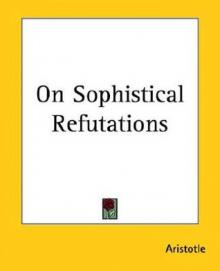 On Sophistical Refutations
On Sophistical Refutations The Categories
The Categories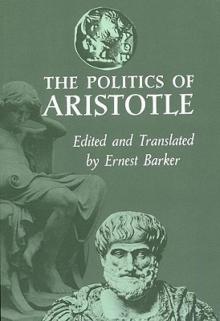 The Politics of Aristotle
The Politics of Aristotle Nicomachean Ethics
Nicomachean Ethics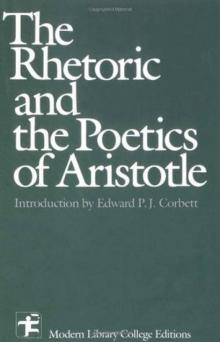 The Rhetoric & the Poetics of Aristotle
The Rhetoric & the Poetics of Aristotle POSTERIOR ANALYTICS
POSTERIOR ANALYTICS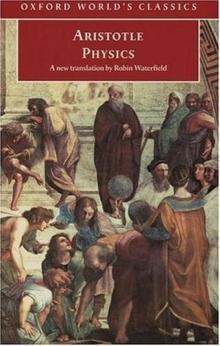 Physics
Physics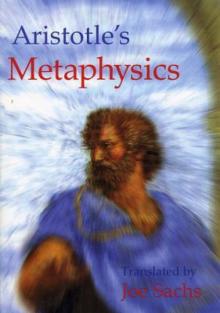 Metaphysics
Metaphysics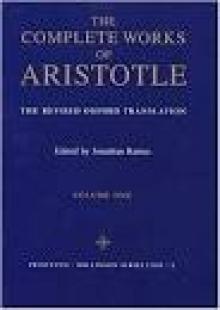 Various Works
Various Works